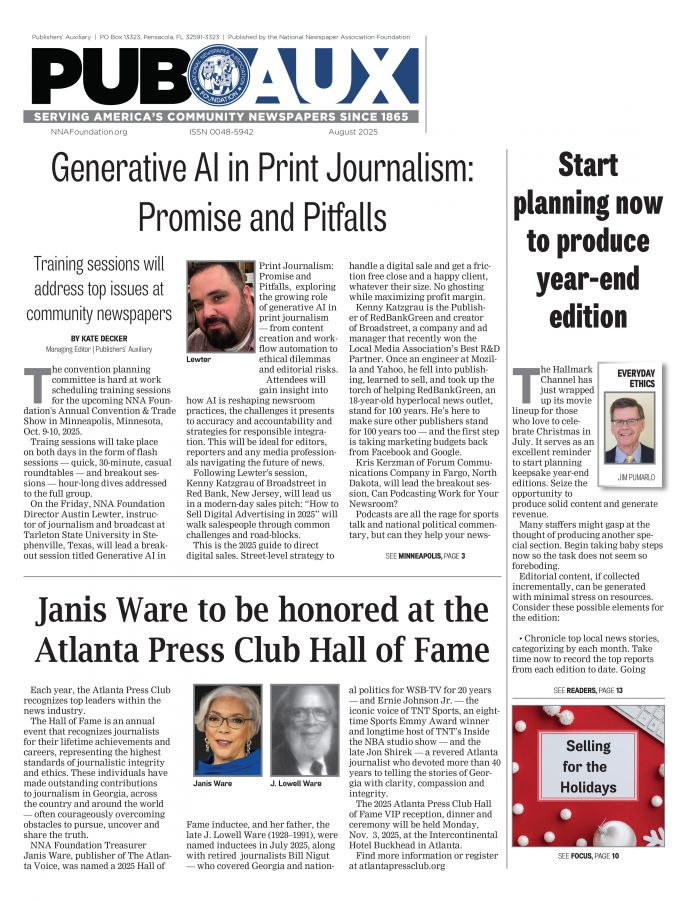Local reporters struggle and shine covering Alex Murdaugh murder trial
Teri Saylor
Special to Publishers' Auxiliary
Jun 1, 2023

“Oh, what a tangled web we weave when first we practice to deceive,” Alex Murdaugh said from the witness stand at the Colleton County Courthouse in Walterboro, South Carolina, last February, quoting Scottish author Walter Scott. Murdaugh was on trial for the June 7, 2021, murders of his wife, Maggie, and son, Paul.
Murdaugh tucked years of serious crimes inside the nooks and crannies of South Carolina’s low country, but secrets and lies don’t stay hidden forever.
For years, death had swirled around the Murdaugh clan as Alex Murdaugh was stealing money from his firm, friends, clients, colleagues and his own family, a total take estimated at $10 million.
His trial in the fourteenth circuit of the South Carolina Circuit Court began on January 25 and ended on March 2 with a guilty verdict on all counts. He was sentenced to two consecutive life terms without the possibility of parole.
The trial was the culmination of one of the most high-profile and sensational cases in South Carolina legal history.
For national media, the trial brought a bonanza. But some local newspapers that cover the low country and come face-to-face with their readers every day were out of their comfort zone.
Michael DeWitt, managing editor of the Gannett-owned Hampton Guardian, covered the trial for his local readers and the USA Today Network.
Charlotte Norwood, a longtime marketing executive, navigated her transition as the new publisher of The (Walterboro) Press Standard with the trial as a backdrop.
John Monk, a legendary investigative reporter, applied his decades of experience to lead the coverage for The (Columbia) State.
Here are their stories.
MICHAEL DEWITT, MANAGING EDITOR, THE HAMPTON GUARDIAN
Recent headlines in the weekly Hampton County Guardian announce a new dentist in town and celebrate the Patrick Henry Academy’s baseball team for winning the South Carolina Independent School Association State Championship Series.
It’s just a normal news day in Hampton, and that suits Michael DeWitt just fine.
As the longtime editor of the 144-year-old Hampton County Guardian, DeWitt is woven into fabric of the community alongside the storied Murdaugh clan. Covering the Murdaughs’ contributions to the community, alongside their faults and scandals, has always been part of his job, but when people close to Alex Murdaugh began dying violent deaths, DeWitt found himself in new territory.
DeWitt was born and raised in rural Hampton County, in the heart of the low country. His roots run deep. A husband and father, he started his career as the assistant manager of a local meat market to support his family.
“A meat cutter is one of those trades not many people know how to do, and it pays good money, especially in a town like this,” he said.
DeWitt honed his blue-collar skills during his 20s and put himself through college at the University of South Carolina’s local campus in Salkahachie.
Harboring a lifelong ambition to be a writer, an early mid-life crisis in his 30s led him to leave the meat market and take a job with the weekly Hampton County Guardian, making $9 an hour as an entry–level reporter. Over time, he worked his way up to editor.
“I’ve been here covering this community for almost 20 years,” he said. “I’ve written about hunting and fishing, life in the rural south and life on the farm, and that was everything I wanted to do.”
As life unfolds in small towns, reporters can’t control what makes news. The day came when Alex Murdaugh’s crimes dragged DeWitt into the world of fraud, theft, betrayal and murder, all coming to a head during a six-week trial that would consume him and thrust him into the national spotlight.
It’s a role with which he continues to struggle.
“My job is to cover all of Hampton County, and I was doing a fairly decent job, but during the six weeks of the trial, local news wasn’t being published,” he said.
For months, DeWitt became a sort of national journalist on a local story, attracting online readers and true crime fanatics from far and wide, and appearing on a variety of nationally televised and streaming true crime shows. And when local readers picked up The Hampton County Guardian, it was full of Murdaugh murder stories.
“I’ve heard all the complaints,” he said. “They were sick and tired of this coverage and wanted to read something other than Murdaugh.”
It didn’t help that his community was embarrassed by the national media coverage — mostly what the tabloids put out.
“Reporters from New York and California came in here and painted us as a corrupt backwater town, and they painted the Murdaugh family as just southern Dixie mafia,” he said. “It was so wrong.”
The Murdaugh family has always loomed large in Hampton. Their law firm’s behemoth office building takes over an entire block in the tiny town. Formerly known as Peters, Murdaugh, Parker, Eltzroth & Detrick, the firm has rebranded as The Parker Law group in the wake of the murders and financial scandals.
DeWitt has been there to cover it all — the good, the bad and the ugly.
“I covered the Murdaugh family whenever they donated something to the community, which they did a lot of,” he said. “I was there in 2018 when Randolph Murdaugh (Alex’s father) received the Order of the Palmetto from the governor, and I did a story on that.”
Alex’s mother, Libby Murdaugh, taught him English in middle school, and later when she was elected to the local school board, DeWitt attended meetings and wrote about those.
“I’m thoroughly familiar with that family,” he said.
During the trial, Gannett elevated his trial coverage and thrust him into the national media spotlight. He credits the USA Today Network and teams in Greenville and Augusta, Georgia, for supporting him.
The court proceedings were fast paced, and the USA Today Network needed daily reporting, so DeWitt prepared his story packages in the cab of his pickup truck.
During lunch breaks, he would sit in his truck, eat a ham sandwich and send a few paragraphs at a time through Microsoft Teams to the publisher in Greenville. Editors there and in other newsrooms knitted DeWitt’s paragraphs into a story, added links, pictures and videos.
“I’d come out later, and there would be this wonderful story with all the photos from the trial, he said. “It was a 100% team effort.”
There were days when he was overwhelmed, and sometimes he was tempted to walk away. But he embraced the challenge and learned to write for a national audience.
Through it all, he managed to write two books that are coming out this summer. One is titled “Wicked Hampton County,” and the other one is “Fall of the House of Murdaugh.” Now Hampton County readers want their newspaper back.
“People want me to go back to writing about grandma’s pound cake recipes and the school board and county council, and little Johnny hitting five home runs in one game,” DeWitt said. “They’re sick and tired of murder and crime. They want positive news, and they want to celebrate Hampton County again.”
Meanwhile, things have changed at The Hampton County Guardian. The newspaper closed its office about a year ago, and a dance studio occupies the space.
On a sunny March morning at Juliennes Espresso Café, Hampton’s only coffee shop, DeWitt and a reporter are wrapping up an interview when an elderly man shuffles over to DeWitt and taps his walking cane against a booth.
He teases DeWitt, briefly brings up the Guardian’s coverage of the Murdaugh trial and says it was much better than the national reporting.
“You’ve always told us the truth,” he says.
DeWitt replies “Well, I try.”
(l-r) Rebecca Yon, advertising manager and Charlotte Norwood, publisher, Press & Standard in Walterboro, South Carolina
CHARLOTTE NORWOOD, PUBLISHER, PRESS & STANDARD, WALTERBORO
As a new publisher at The Press & Standard in Walterboro, Charlotte Norwood was starting to get into the community’s good graces and bolster the newspaper’s budget when the Murdaugh trial virtually shut down the town for six weeks.
Alex Murdaugh had been in the headlines for nearly a year when Norwood joined Smith Newspapers as the publisher and CEO of The Press & Standard.
She did not know what she was walking into. Norwood and new ad manager, Rebecca Yon, described their introduction to Walterboro while sitting in the newspaper’s spacious offices last March, a couple of weeks after the trial ended.“I came here at the end of May last year, and I didn’t know anything about Murdaugh,” Norwood said.
Nevertheless, she got busy improving the newspaper’s financial picture and was seeing success until February, when the Murdaugh trial became a media sensation.
“We had been making our budget for the previous six months and doing well, but during the trial, we struggled with sales,” she said. “Nobody wanted to advertise, and we took a huge hit.”
On a positive note, subscriptions increased during the trial. And the newspaper’s Facebook page swelled to 16,000 followers.
The Press & Standard, founded in 1877, is published weekly on Thursdays. It is delivered by mail to 4,000 subscribers. The newspaper also publishes a weekly shopper, delivered free to 10,500 homes.
Norwood is a seasoned marketing professional with an MBA who has worked on the business side of newspapers across most of her career. She’s had stints at The Charlotte (North Carolina) Observer, the Greenville (South Carolina) Daily News, the Sinclair Broadcast Group and the Post & Courier of Charleston.
“Coming in as a new publisher, rebuilding the staff, and trying to create rapport with the community doesn’t always make you warm and fuzzy,” she said.
She was not prepared for the impact the trial had on the town and on her newspaper.
“We’re talking about three solid blocks of local businesses virtually shutting down, and in a community this size, that’s about the entire downtown,” she said.
“The trial stifled any kind of real revenue for us, and it stifled a lot of community news.”
At the time, the newspaper did not have an editor, its news hole filled with as much local news as Norwood could gather. At the end of the day, she relied on courtroom photos from pool photographers. The town was consumed with the trial, and there was not much else to report on.
“We wanted to have local stories that aligned with all the Murdaugh news to keep it top of mind and keep Walterboro relevant,” she said. “But my biggest challenge was to make sure my community had more to offer than just the courthouse.”
For Yon, joining the paper during the trial was eye-opening. Before working at The Press & Standard, she was a server at two restaurants and had previously managed a dentist’s office. Getting up to speed on her new job and meeting the business community was challenging.
“Trying to meet new people here was hard because nobody wanted to open their door, pick up their phone or answer an email from me,” she said. “I had to just get out there, smile and meet people.”
Today, the community has become more welcoming.
“I feel people are warming up to me and getting to know me better, and it’s getting easier,” she said.
JOHN MONK, REPORTER, THE STATE, COLUMBIA
To many journalists across South Carolina, John Monk is a legend, known for his skill in developing sources, a writing style that weaves stories into tapestries, and his willingness to coach and mentor young reporters.
Law and politics are his world.
He has been an investigative reporter with The State in Columbia since 1996, and before that, he was a Washington correspondent and South Carolina bureau chief for The Charlotte Observer.
“I wouldn’t say I’m an expert, but I probably have more contacts in the legal and political community and more knowledge about how to cover them than many other reporters in the state,” he said.
Monk has known about the Murdaugh machine for over 20 years and recalls one of his first stories was about a provision in state law that allowed most personal injury lawsuits to be tried in Hampton County. That provision has since been repealed.
“Peters Murdaugh Parker Eltzroth & Detrick grew to be a major law firm because so many personal injury lawsuits with huge verdicts or settlements were brought in tiny Hampton County,” he said. “The firm sued the railroad so many times, it is often called ‘The House that CSX built.’
After Mallory Beach died in the 2019 boat crash involving Paul Murdaugh, Monk was assigned to do a major story on the family dynasty. Under the headline, “Powerful SC family faces scrutiny following boat crash that killed 19-year-old woman,” the story traced the Murdaugh history, scandals, prolific litigation and the family’s dynamics.
Sitting in a coffee shop near the Capitol in Columbia a couple of weeks after Murdaugh’s murder conviction, Monk described events leading up to Alex Murdaugh’s murder trial.
“The night Maggie and Paul were shot, I received some texts from people in the middle of the night,” he said. “So at 6:00 the next morning, I began calling people for confirmation, and by 7:00 I had confirmed it with my sources.”
He recalled thinking that it would be a huge story.
He was correct, and by the time Murdaugh had been sentenced, Monk had written some 200 articles about the case — many of them breaking news, and others crucial in-depth stories.
When editors at The State planned their coverage of Murdaugh’s trial, they assigned two reporters to watch the court proceedings unfold on TV and write one-dimensional stories about the testimony, Monk said.
The paper also established a super-early noon deadline for the print edition each day.
“I was shocked, and I remain in shock,” he said about the early deadline.
Monk’s daily routine after court ended included merging the best stories of the day and include his perceptions about the proceedings while blending in major themes. He also corrected errors while adding his observations from inside the courtroom.
“It was a cool strategy, but I only had about an hour to do all that, so some days worked better than others,” he said.
Monk calls the Murdaugh trial the “Super Bowl” of American trials, and says it had everything — a brutal murder shrouded in mystery, a family legacy ruined by white collar crime, and a fourth-generation son stealing more than $10 million, then landing in prison for killing his family.
“It was a monstrous betrayal of trust,” he said. “And it all unfolded in a small southern town.”
The State, founded in 1891, is part of the McClatchy Company. Its website indicates a reach of 2.7 million digital monthly visitors and 260,000 weekly print readers. It is the second largest newspaper in South Carolina. As a capital city, the newspaper still covers news across the entire state.
Monk says he joined The State team to write about statewide and national themes in a way that that's relevant to the newspaper’s audience.
“My editors don’t think about it like ‘Oh, Monk’s writing about this little law firm in Hampton County,’” he said. “They know I’m writing about that little law firm in a way that all our readers can relate to.”
Teri Saylor is a writer in Raleigh, North Carolina. Reach her at terisaylor@hotmail.com.













